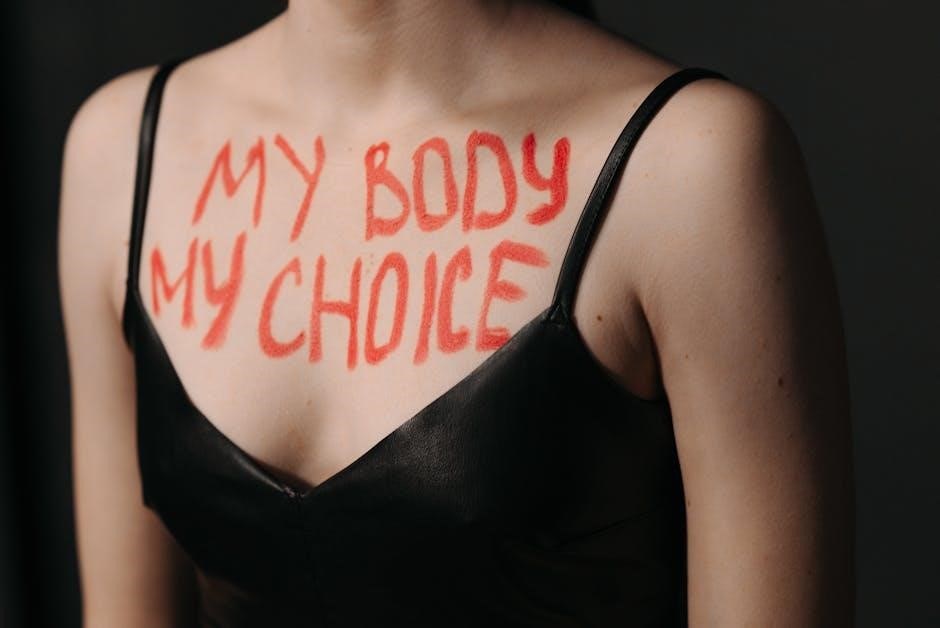bad feminist pdf
Roxane Gay’s Bad Feminist is a collection of essays blending humor and sharp critique on feminism, culture, and identity. The title challenges traditional feminist ideals, emphasizing individuality and inclusivity. The book’s accessibility as a PDF and eBook has made it a widely-read and influential text in contemporary feminist literature.
1.1 Overview of Roxane Gay’s Collection of Essays
Roxane Gay’s Bad Feminist is a thought-provoking collection of essays that explores themes of gender, identity, and culture. With humor and incisive critique, Gay challenges societal norms and stereotypes, offering fresh perspectives on what it means to be a feminist. The essays span personal anecdotes, pop culture analysis, and political commentary, creating a relatable and impactful narrative. Gay’s writing is both accessible and profound, making the collection a pivotal work in contemporary feminist literature. Her ability to blend vulnerability with sharp insight has resonated with readers worldwide, solidifying the book’s reputation as a must-read for understanding modern feminism.
1.2 The Significance of the Title “Bad Feminist”
The title Bad Feminist reflects Roxane Gay’s rejection of rigid feminist stereotypes. It challenges the notion that feminists must conform to specific ideals, embracing instead the complexity of individual experiences. Gay admits to once claiming black as her favorite color to appear edgy, later revealing her true preference for pink. This duality mirrors her broader message: feminism is not about perfection but about embracing one’s true self. The title underscores the book’s central theme of redefining feminism to include imperfections, contradictions, and personal truths, making it a powerful call for inclusivity and authenticity in feminist discourse.

Themes and Ideas Explored in “Bad Feminist”
Roxane Gay explores themes of gender roles, identity, and media representation, critiquing modern feminism’s limitations while advocating for inclusivity and diversity in the feminist movement.
2.1 Gender Roles and Identity
Roxane Gay delves into the rigid constructs of gender roles and identity, challenging societal expectations placed on individuals. She reflects on personal experiences, like preferring pink over black, to illustrate how identity is shaped by cultural norms. Gay emphasizes the fluidity of gender and the importance of self-definition, urging readers to embrace their true selves. Her critique extends to how media often enforces binary gender roles, limiting personal expression. By sharing her journey, Gay advocates for a more inclusive understanding of gender, encouraging individuals to break free from restrictive labels and embrace their authentic identities.
2.2 Critique of Modern Feminism
Roxane Gay critiques modern feminism for its exclusivity and hypocrisy, arguing that it often fails to represent marginalized voices. She challenges the notion of a “perfect feminist,” highlighting how the movement can alienate those who don’t conform to its ideals. Gay emphasizes the importance of inclusivity, advocating for a feminism that embraces diversity in race, class, and sexuality. She also critiques the commercialization of feminism, where it becomes a marketing tool rather than a genuine fight for equality; Gay’s essays call for a more authentic and expansive understanding of feminism, one that prioritizes freedom and equality for all.
2.4 Representation in Media and Culture
Roxane Gay critiques the lack of diverse representation in media, emphasizing how stereotypes perpetuate limited narratives about women, particularly women of color. She argues that media often reduces women to simplistic roles, ignoring their complexity and agency. Gay highlights how consumer culture reinforces these portrayals, shaping societal expectations and individual identities. She advocates for more nuanced and inclusive representations, challenging the industry to reflect the multifaceted experiences of women. Gay’s essays underscore the importance of media literacy and the need to question and redefine how women are portrayed in popular culture, advocating for authenticity and diversity in storytelling.

Digital Accessibility of “Bad Feminist”
Bad Feminist is widely available as a PDF and in eBook formats on major platforms like Amazon and Apple Books, ensuring easy access for readers worldwide.
3.1 PDF Downloads and eBook Formats
Roxane Gay’s Bad Feminist is widely available in digital formats, including PDF downloads and eBooks. Readers can access the book on platforms like Amazon Kindle and Apple Books, ensuring convenience. The PDF version is particularly popular, often shared across online forums and repositories. Additionally, the text can be sent to Kindle devices via email or apps, making it easily accessible. While free downloads are common, supporters are encouraged to purchase the original or borrow from libraries to back the author and publishers. This digital accessibility has played a significant role in spreading Gay’s ideas to a global audience.
3.2 Availability on Major Platforms Like Amazon and Apple Books
Roxane Gay’s Bad Feminist is readily available on major platforms like Amazon and Apple Books, ensuring widespread accessibility. The book can be purchased in eBook formats, including Kindle and ePub, making it easy for readers to download and enjoy. Its presence on these platforms highlights its popularity and reach, contributing to its status as a bestseller. This accessibility has played a crucial role in spreading Gay’s influential ideas to a global audience, further solidifying its impact on contemporary feminist discourse.
Cultural Impact of “Bad Feminist”
Bad Feminist has sparked crucial conversations about identity, culture, and feminism, resonating with diverse audiences. Its sharp commentary and relatable humor have solidified its influence in modern discourse.
4.1 Contribution to Feminist Discourse
Roxane Gay’s Bad Feminist has significantly enriched feminist discourse by challenging rigid definitions of feminism. Her essays critique cultural norms, advocate for inclusivity, and highlight the importance of diverse voices. By addressing topics like gender roles, media representation, and personal identity, Gay’s work has encouraged a broader, more nuanced understanding of feminism. The book’s accessibility in formats like PDF has allowed it to reach a wide audience, fostering conversations across different platforms and communities. Its influence continues to inspire new perspectives, making it a pivotal text in modern feminist literature.
4.2 Reception and Reviews
Bad Feminist has received widespread critical acclaim for its thought-provoking and accessible exploration of feminist issues. Reviewers praise Roxane Gay’s sharp wit, vulnerability, and ability to connect personal experiences with broader cultural critiques. The book holds a 4/5 rating on various platforms, with readers appreciating its inclusive and nuanced perspective on feminism. Critics highlight its role in sparking essential conversations about identity, media representation, and societal expectations. The availability of Bad Feminist as a PDF and on major platforms has further amplified its reach, making it a must-read for anyone interested in contemporary feminist discourse.
Comparison with Other Feminist Works
Roxane Gay’s Bad Feminist stands out for its accessible, inclusive approach, differing from more rigid feminist texts. Its blend of humor and critique offers a fresh perspective, resonating with diverse audiences.
5.1 Similarities and Differences with Other Authors
Roxane Gay’s Bad Feminist shares a critical examination of gender roles with authors like bell hooks, yet differs in its accessible, conversational tone. While hooks delves into theoretical frameworks, Gay uses personal anecdotes and pop culture, making her work relatable. Chimamanda Ngozi Adichie’s direct, experiential approach in We Should All Be Feminists aligns with Gay’s call for inclusivity, though Gay’s humor and critique of modern feminism stand out. Both authors aim to challenge patriarchal structures but vary in style and audience engagement, with Gay bridging academia and popular culture effectively.

Roxane Gay’s Personal Reflections
Roxane Gay reflects on her journey as a feminist writer, blending personal anecdotes with cultural critique, while embracing her identity and love for pink, challenging stereotypes.
6.1 Her Journey as a Feminist Writer
Roxane Gay’s journey as a feminist writer is marked by her unapologetic voice and unique perspective. From her early days as a critic to her rise as a prominent feminist author, Gay has consistently challenged norms. Her essays in Bad Feminist showcase her evolution, blending personal experiences with cultural analysis. Gay’s ability to connect the personal to the political has made her a leading figure in contemporary feminist literature. Her work continues to inspire, offering a fresh and inclusive vision of feminism that resonates with diverse audiences worldwide.

The Future of Feminist Literature
Bad Feminist plays a pivotal role in shaping future feminist conversations, offering accessible, inclusive perspectives that inspire new generations of writers and readers to challenge societal norms.
7.1 The Role of “Bad Feminist” in Shaping Conversations
Bad Feminist has become a cornerstone in modern feminist discourse, offering a fresh, inclusive perspective that challenges traditional norms. Its accessible format, including PDF downloads, has broadened its reach, inspiring new writers to explore intersectional themes. By addressing identity, culture, and personal experiences, Roxane Gay’s work fosters dialogue on feminism’s evolving nature. The book’s relatable tone and critical insights have made it a catalyst for change, encouraging readers to question societal expectations and advocate for equity. Its influence ensures that feminist literature remains dynamic, paving the way for future voices to continue the conversation.
